Celia Lake's Blog, page 8
June 14, 2023
Idea to Book: Mistress of Birds
Welcome to our idea to book post for the last book in the Mysterious Powers series, Mistress of Birds. The idea for this book grew out of three things: a desire to try my hand at something more in the gothic vein, being fascinated by Dartmoor, and of course, apples. (With a bonus note about titles, for fun.)
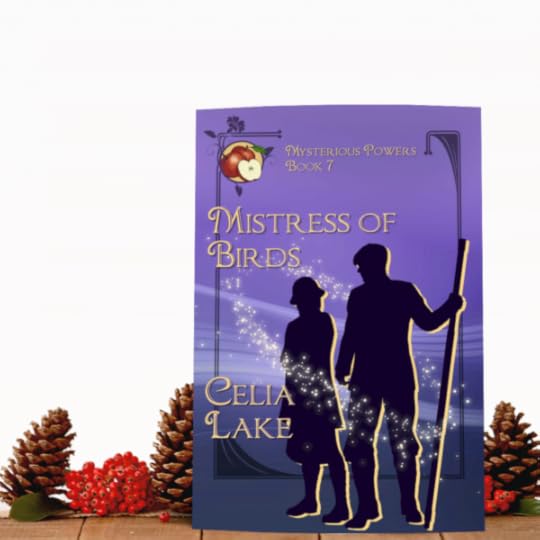 The title
The titleThe title actually showed up very early for this one. I can’t start writing a book until I have a title – what would I call the file? But most of them, I come up with the title somewhere between a week before I start and maybe a month at the outside. (I usually outline the next book two weeks before I start it.) Titles are one of the things where it works better if I let things sit in my brain and then come up with them without putting a lot of time pressure on them.
In this case, I was lying on the couch, innocently reading a book about folklore related to birds for a non-writing project, and then the title came and landed on my head. One of my house rules is that I don’t turn down words that want to be written, and I certainly don’t turn down titles, so I promptly made a new file, wrote it down, added a few notes, and tucked it away until I was ready to outline the book properly.
A gothicGothic romances have some specific points they need to hit. A remote location, an unusual enviroment, things going on that don’t quite add up are an excellent start.
In this case, I started with a piece of that bird lore, that cuckoos were held to be the coming of spring in England, and that they left in the fall (they’re migratory there). And of course, being me, one of my first thoughts when I read that was “What happens if someone tried to hold back time by keeping a cuckoo? Or something very like a cuckoo.”
(Look, sometimes the inside of my head had some rather expansive ideas.)
It fit very nicely with some of the Fatae lore already in my books. It had a gloriously eerie quality. And most importantly, it seemed like the kind of thing that could have a subtle, long-lasting effect without being entirely obviously noticeable to anyone outside the direct range of the effect.
And of course, by gothic standards, the eerie being really needed to be in the attic. Or at least the top floor of the house.
DartmoorObviously, for a gothic, I needed a nice remote location to put people in. I’ve been intrigued by Dartmoor for a long time. Certainly since I read the Mary Russell book The Moor by Laurie R. King which features Sabine Baring-Gould (also mentioned in Mistress of Birds, or rather one of his many books is). It’s a place with a range of interesting history, a lot of remote spots (even those relatively close to villages), and some fascinating legends. Those range from the ones about hares and witches to the “Hairy Hands of Dartmoor” (more an urban legend, except for not being urban at all…).
Getting to spend a bit of time just off the moor, and then a little slice on top of it was a delight. I deeply enjoyed getting to look at photographs, maps, and historical information. And maybe sometime I’ll get to make a trip there.
ApplesFinally, there are the apples. There are so very many kinds of apples. Fortunately for me, there are also people who delight in making databases of apple varieties, so I was able to search to find varieties found in Devon, with various harvest dates, and with different kinds of uses. Eating apples are different than cider apples, of course.
(Figuring out the harvest dates was particularly tricky. I had an idea of the time effect and what it did, but I wanted the apples in Adam’s uncle’s orchard to ripen, just noticeably more slowly than usual, extending the spring-summer-fall and condensing the winter season. So first I had to figure out the usual harvest dates, and then how that would extend.)
All of this came together into Mistress of Birds, along with the ways that the trauma of the Great War continues to have an impact and a dash of village life. If this sounds like your sort of thing, check out Mistress of Birds.
June 7, 2023
Summer (any time) reading fun
It’s time for summer reading challenges where I am. Whatever time of year it is for you, I thought it might be fun to do a round up of some reading challenges. Some of these come from libraries, and some come from other groups. I’m still waiting on my local library’s challenge (out on June 17th), but I’m thinking about how I’d like to nudge my reading a little bit.

(To be honest, a lot of it has been research reading, one way or another, and I would like to mix it up, and also just read more.)
Here are some different challenges to check out. You can also check your local library systems (a lot of libraries put something together for adults, as well as for kids and teens.) If there’s nothing up yet, check back later in June, my local public library isn’t launching theirs until the 17th.
The Facebook group Indie Fantasy Addicts (A reader let me know they put together a summer reading challenge – focusing, as you would guess from the title, indie fantasy authors.) The Ripped Bodice (a romance-only bookstore) summer bingoBoston Public Library summer bingo for inspiration, and here are their booklists for ideas for specific spots.And here are a few year-long or other time period challenges:
Book Riot’s 2023 Read Harder ChallengeReading challenges on The Story Graph (you can explore without having an account)Looking for books that fit categories?Here are some of mine that fill challenges linked above (and if you’re looking for more ideas, just let me know.)
Books about books or libraries: Bound For Perdition is about making books, rather than the contents. Thalia in Mistress of Birds is an aspiring author. Kate does several rounds of research in the library in Wards for the Roses.
Disabled or neurodivergent author: Hi! Any of my books count for this one.
Book with a red cover: Wards for the Roses, Best Foot Forward (and depending on your definitions of red, Point By Point)
Learn about nature: The Fossil Door (in a fictional context, but the Scottish geology and natural history is accurate.)
One of your favorite author’s favorite books: All of the books in this Patreon post on “Seven books to get to know me” from January are favourites (except the Seuss, which is fine, just not one I return to as an adult…) The post has a bit more about why.
Romance with bisexual representation: Best Foot Forward (Also Point By Point.) Technically also Goblin Fruit and Ancient Trust, but fleetingly there.
Author local to you (if you’re near Boston): Hello again!
A blue cover : Sailor’s Jewel and Winter’s Charms
Read a Book by an Academic Authority on a Folkloric(ish) Subject: Phantom Armies of the Night: The Wild Hunt and the Ghostly Processions of the Undead by Claude Leconteux or The Witch: A History of Fear, from Ancient Times to the Present by Ronald Hutton (or Hutton’s Stations of the Sun or a number of other of his books) are my rec here.
Creature feature : Magician’s Hoard involves shapeshifting.
Kissing for Science: I’d like to make the argument that Eclipse fits here.
Cover has a body of water on it : Technically only implied, but the ocean liner on the cover of Sailor’s Jewel is definitely floating on water and the cover is blue.
Fae/Fairies: Seven Sisters and Fool’s Gold
Happily Ever After: All of them!
Relationship of convenience: Goblin Fruit, Point By Point, and you could make arguments for Eclipse and Best Foot Forward.
May 25, 2023
Writing and the question of AI
If you’ve been anywhere on the Internet recently, you’ve probably seen a lot of comments about the use of artificial intelligence (AI) and machine learning when it comes to creative applications like art and writing. (Among other reasons, it’s a big part of the current Writer’s Guild of America strike.) It’s about time for a post from me about what that means for my writing, and then some general thoughts about the larger implications of these new and ever-improving technologies.
One thing that’s making some of these conversations complicated is that people are using the terms “artificial intelligence” and “machine learning” in a variety of ways. Here we’re mostly talking about situations where computers use information they’ve been trained on to give output (basically, making predictions of what makes sense based on what they’ve already seen.)
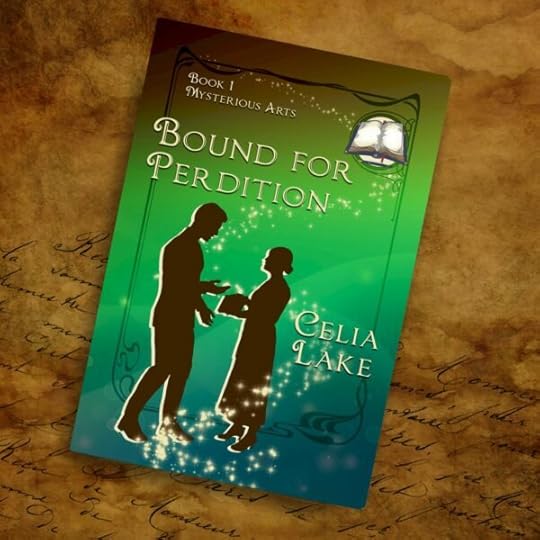 My writing
My writingFirst off, all of my writing comes out of my own head. I do not use any kind of generative technology tool for ideas (I have plenty), creating text, or anything else like that.
DraftingI use various computer tools as part of the writing process, of course, but nothing that has any kind of predictive creative aspect. Those tools include Scrivener, 4theWords, AeonTimeline, and Obsidian, . I also use some mapping tools and of course internet search tools. Those search tools do have some predictive aspects built in these days. I talk through parts of my thoughts with Kiya (friend and editor) as well as sometimes other friends or folks on the Discord when I’m trying to figure out how a particular aspect works.
Fundamentally, that’s for two reasons. First, there’s a lot of information and worldbuilding detail and ‘how does this connect’ that is basically only in my head. (Though a fair bit of it is also in Kiya’s head, these days.)
Second, of course, I really love writing! Writing is the point of the exercise here, why would I want something else to do it?
Not that I don’t have my nights where I’m staring at a blank screen and going ‘why won’t the computer just understand what I want on the page and make that happen?’ But I do actually want to be the one doing all that writing and making decisions.
EditingI do use a tool with some predictive aspects to it for a particular stage of editing. To be honest, many of the tools I actually use have been part of spelling and grammar checkers for a long time now, just in a more limited way than the most recent tools allow. (If you use autocorrect on your phone, that’s also predictive.)
I start by going through my own work myself, making notes of things that need to be edited throughout the whole book, as well as where I need to make changes in specific chapters. All my own brain!
Then I move it into a tool called ProWritingAid, which offers a number of different specific editing tools. While they have been adding an AI-driven tool (Rephrase), I never use it. That’s both because I rarely want to rephrase things for the reasons it suggests, and because when I do, the words it suggests are usually not helpful to me.
(Among other problems, it doesn’t always deal elegantly with the fact I’m writing in the 1920s. I’ll use a gendered term like ‘waitress’, it will suggest I want something more gender-neutral, and I will stare at it and go ‘nope, still 1920s’. A useful edit for some people, but not stylistically useful for me.)
How I use ProWritingAidI mostly use it for the following tools:
Taming my commas.Catching typos and missing words. (See the note on this one below.) Cutting down long sentences. (No, Alexander, you may not have a 65 word sentence.) Checking consistency for British spelling and usage. Avoiding some phrases and words I overuse (via their “house rules” settings).That second point – catching typos and missing words – is an accessibility tool for me. I do sometimes have weird brain glitches (after a bout of extended low-grade migraine about 8.5 years ago now) which means I will sometimes leave out a word, flip the word I meant for something else, or do other weird typos. It means that a grammar check that will flag those is particularly helpful to me, since it lets me clean those up before the next editing stage. That does generally involve some degree of predictive tool, but not one that is creating new text or content.
However, no matter what edits ProWritingAid suggests, I’m the one deciding what to change and what to keep. On average, I take maybe half the suggestions it makes (or look at it, agree that I need to change something, but do something other than what it reccomends). I usually take all its recommendations for consistency, and almost all of them for sentence length (but both of those are pretty mechanical things).
After I run the chapters through ProWritingAid, it goes off to Kiya for editing. (I promise Kiya is a real human!) The last stage is when it goes to my early readers (also real humans!), who also check and make sure things make sense, tell me if there are details that need a little more exploration, and so on.
My coversMy covers are also all human designed (by the most excellent Augusta Scarlett), though there are a couple of pieces where it’s a little harder to say “this was all human input”.
I’m planning a post (or a couple of them) about cover design sometime soon, not least because I want to talk about the designs for the Land Mysteries series in particular. However, my 1920s covers are basically a combination of a vector that provides the colour background pattern, a vector that provides the stars or sparkles, a frame, some sort of inset image, and then of course the people on the cover. The Land Mysteries have a chart, a map, and figures.
All of those – except the people in everything after my first series – come from stock image sites. You can consider a lot of them to be functionally equivalent to paint colours or brushes or other tools, designed to be used by someone else to create more complex images. Augusta combines and edits them (changing the colours, smoothing some lines, etc.) to suit what we need. There are vast libraries of all of those types of images out there. With sites that use licenses, there’s a specific creator associated with each work who gets some income from it.
Cover design practicesCombining a series of stock images or pre-existing vectors has been really common in book publishing for a good while. It’s out of the price range of not only most indie publishers but many trad publishers to have full out original artwork painted for every cover. That’s why you see a lot of covers with similar images, heroes, etc. People are working from the same pool of stock art.
So the common practice has involved taking various existing pieces via stock image licenses, combining them in new ways, and maybe adding some creative details on top of that design work. And to be clear, figuring out how to choose and combine elements to make a cohesive cover is definitely a creative process all of its own! (As you can see from my covers, in fact.)
The figures on my covers at this point are done via 3D design software, to get the position and clothing we want. Sometimes what they’re wearing under the silhouette mask is completely hilarious, for the record, because all we care about is what the outline looks like, not the other details. August then edits to smooth things out as needed. (Or as in the cover for Forged in Combat, “Can you make the bustle a little more elongated? Sorry, 1882 was really specific about bustles.”)
Again, the clothing and figures she’s using come from individual creators who’ve licensed or sold those models for use. (The figures on my first series, Mysterious Charm, all come from stock art images, but everything after that is a unique 3D image that Augusta did for me.)
About those stock imagesNow, in the United States, AI generated work (either images or text) can’t be copyrighted, which presents a challenge for licensing and other legal agreements.
On the other hand, logically speaking, there’s a decent chance that at least a little of what’s up on those sites right now might have had AI generation involved. It’s really hard to tell from the end-user point of view, and that’s probably going to continue to be the case for a while. (Some places are identifying these already, some places aren’t. And it largely relies on people self-reporting the source.)
Why all the discussion?I’m not going to get extensively into all the current discussions about AI art and writing and the concerns people have, but I do want to note a couple of them for people who want to do more reading and research. The basic concerns are four-fold, when it comes to writing.
Replacing writersOne big concern, of course, is that AI tools will replace writers. While these tools aren’t great at fiction (here’s a post from author KJ Charles talking about what the actual AI fiction output from Story Engine looks like without editing), they can be a lot better at things like text summaries, simple marketing copy, etc.
Those are all jobs involving writers! A number of industries are also looking at whether they could use AI tools to significantly cut down the number of writers they need to pay, or turn what are currently writing jobs into more like ‘editing AI content into making sense jobs’ (which is a very different kind of work, for one thing).
Trained without consentFor any AI or machine learning tool to work, it has to have material to work from. (This is what’s referred to as ‘training’ the tool, or a dataset.) You may already have seen a lot of commentary about the art AI tools, and how they will do their best to produce art in the style of an artist. How do they do that? They’ve been exposed to that artist’s work. When an artist is long-dead, their work is widely avaible via museum sites, etc. that’s one thing. But when it’s currently creating artists who rely on people buying their art to make a living, that’s a very different sort of problem.
It’s become clear (especially in the last week or so as I publish this) that some of the writing AI sets have been trained on data that is visible on the public web, but where the creators did not agree to have it used for those purposes. The biggest example here is fanfiction, which produces some very identifiable quirks…
Training a tool on current writer and artist’s work without consent – especially in ways that mean you can then replace those people’s work – is a huge problem.
Overloading the publishing infrastructureAnother big concern is that people will think that they can generate text (using AI) and use that to get into publishing. Are these stories any good? Nope, basically never. Can they swamp and overwhelm both publishers (for submissions) or readers (via self-publishing outlets like ebooks)? Absolutely.
As a reader, I’m concerned about that. (I want to support real creative humans!) And as an author and librarian, I’m concerned about what it means for readers looking to find satisfying stories and books, and what some of the current discovery tools being swamped means.
Neil Clarke, who edits a major SF short story venue, has been writing about what the rise in AI written stories has meant on the editing and submission side. (The most recent post as I put this up talks about the current state of things, but that link will show you earlier posts where he talks about the massive rise in AI submissions that are absolutely not usable.)
Citing things that don’t existFinally, and with my librarian hat on, I’ve already seen comments from colleagues in other libraries about people asking for articles that don’t exist. Here’s the thing. Currently, AI tools aren’t actually much good at research. They can look like they are, though, because at least some of them will make things up that sound plausible. The examples I’ve seen most commonly involve an author who is writing in that field, a title of an article that seems plausible – but that doesn’t actually exist. Sometimes they’ll do things like mention two authors who look like they should work on the same topics, but actually don’t.
I work in a (very) niche research library, and so this hasn’t happened to me yet. (And we’re such a niche field that for most current researchers, either I know how to contact them directly or I know someone who does.) But I’m fully expecting that sometime in the not too distant future, I’m going to get asked for research that sounds plausible but absolutely doesn’t exist.
Questions or thoughts?If you’d like more information, Jason Sandford does a regular newsletter about news related to the science fiction and fantasy community in particular. His recent Genre Grapevine on the Sudowrite Controversy and the Increasing Pushback Against AI (May 21st, 2023) does a fantastic job rounding up more information about many of the points I’ve discussed above with more examples.
If there’s anything else you’d like to know about how I’m handling this in my own writing, drop me a note via the contact form.
The post Writing and the question of AI appeared first on Celia Lake.
May 3, 2023
Reviews and how they help
Reviews are a fantastic way for readers to help out authors they want to support. But a lot of readers are nervous about what to write, where to share them, and what they ought to know about the process.
Here’s a little demystification to help. I’m focusing here obviously on books, but the same basic process can help with music, podcasts, and all sorts of other content out there.
The short version: Leaving a brief (2-3 sentence) review of books you love wherever you get or talk about your books is a fabulous way to both help other readers and the author. They don’t need to be long or complicated to help.
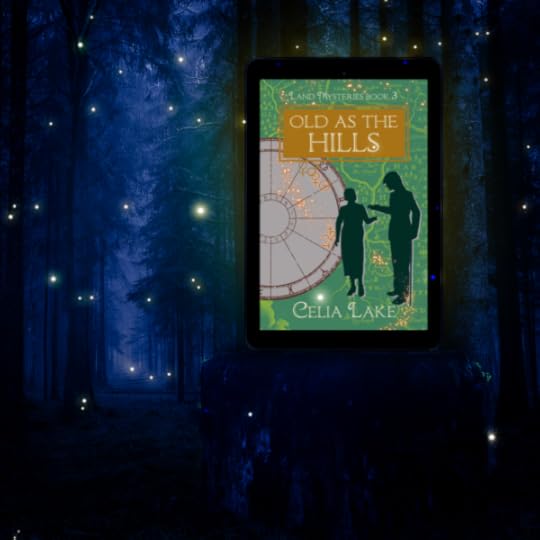 What kind of review are we talking about?
What kind of review are we talking about? When authors talk about reviews helping, what we mean is usually something simple.
We’re talking about a review of one to four sentences from a real human who read the book and wanted to share a couple of thoughts. You don’t need to be elaborate and you don’t need to include tons of details. Reviews like this help provide what gets called “social proof”, that real humans read the book and had a range of feelings about it.
Detailed reviews and literary criticism are fantastic too – but they’re a completely different thing. Many people aren’t up for writing that (and certainly not about all the books or music or whatever else it was they enjoy).
Why do they help?Reviews help readers discover books they might like – and as an author, that’s just what I want.
On a more pragmatic level, having a certain number of reviews or a particular star rating can help authors (especially indie authors like me) with some marketing and promotion opportunities. They also indicate interest in a book that can play into some of the ways that online sites use as part of their algorithms. However, the length, amount of detail, and so on don’t matter as much.
Where to leave a review?Leave your review wherever you get your books! (I’ve included links at the end of this post to the key places for my books.)
This can include bookselling sites like Amazon, Barnes and Noble, Apple, or Kobo. You can also leave reviews at a number of sites that collect and share info about books, like GoodReads, StoryGraph, LibraryThing, BookBub, and others.
Talking about books in other places or formats (like social media, a blog, or YouTube) is also great, but the format and structure may look a little different.
Some sites have requirements before you can leave a review (for example, Amazon often rejects reviews if you haven’t spent a certain low amount via the site).
What’s helpful in a review?Simply, think about what helps you as a reader.
In most cases, someone reading a review will have other information (like the book’s description) handy. However, it can help a lot to include a sentence or so that lets the review reader know what the book’s about. That way, if people come across your review out of context, they still have a sense of the book.
For my books, that might be something like “This 1920s historical fantasy romance…” or “This romance set in England in 1924 with magic…” or “While on a magical ocean liner crossing the Atlantic in 1901….”
Next, say a sentence or two (or more if you like) about the book. This can be things you really enjoyed or how it made you feel. It can be something about the setting or plot that caught your attention. It can be something about a character, like their profession or how they deal with a challenge.
You don’t need to give tons of plot details, but a sentence about what kind of story it is (a friends-to-lovers romance, a mystery on an ocean liner, people who get closer while working together) can be helpful. Looking at the blurb or description might be a nice reminder of key aspects.
The last thing you might want to include is something that especially caught you about a book that other readers might be looking for. A lot of my favourite comments about Pastiche have been people who feel seen and understood because of Alysoun. That sort of comment is really helpful to people looking for that kind of representation.
Does the review have to be all good?Nope. Think about what you’d have liked to know when you were picking this book. If you generally enjoyed the book, some of that’s going to be good things about the book. If there were things that didn’t work for you, it’s useful to talk about those too. Reviews are meant to help readers.
How many stars?Choosing the stars for the rating is a bit tricky – different sites have different customs. On many sites, it’s not going to be obvious to people reading the reviews what your personal standards are. (Some people give five stars to only their top handful of books. Other people give five stars to anything they actively enjoyed.)
Pick something consistent with how you’re talking about the book. “One of the best books I read this year” should probably get five stars. If you give it two stars, that’s confusing. A book with a “here’s some things I liked, and some that didn’t work as well for me” could be anywhere from two to four stars depending on the balance and how you felt. A book you didn’t finish might well be one star.
What’s not helpful in a review?The most unhelpful thing is being unfair, especially in ways that aren’t useful to other readers.
Sometimes reviews blame the wrong person for a problem. For example, if a print book you order online turns up battered, it’s probably not the author who’s responsible for shipping it. You should absolutely check with the shipper about a replacement or refund if it’s not usable, but don’t rate the content of the book poorly because it got to you in rough shape. (Or ignore the content entirely in complaining about the shipping.) For reviews about books, the assumption is that the rating on the review is mostly about the content of the book.
Or I’ve seen some reviews from someone who ordered the wrong book, didn’t like the one they got, and reviewed it badly. Sometimes these are just “I hate this entire genre.” That’s not helpful to other readers, who do like that genre! (These people are not likely to be reading this post, though.)
In general, for a shorter review, getting deeper into the plot details can be tricky. Some people like plot spoilers or don’t care about them, other people really don’t like them. Maybe save the spoiler details for a format where people can decide whether to read them or not (somewhere that lets you click a “read more” tag, or scroll down the page easily, which is usually not the storefront review sites.)
Do authors read reviews?Some do and some don’t.
I believe reviews are for readers. I skim mine every few months just in case there’s something that I can do that’s useful. A couple of times people have mentioned minor glitches in a book, and I am glad to fix those! Easier if you tell me by my contact form, though.
Mostly, though, I don’t read them because that’s reader space. Same way I sometimes come across things about my books, but I won’t respond unless someone tags me into a conversation or maeks it clear they welcome comment from authors in that space.
Places to leave reviewsHere are links to my profile pages on various sites if you want to leave a review for my books. You can also use these to find the other authors you want!
Some sites collect reviews in various ways, like BookBub, GoodReads, and LibraryThing. You can also check out the major ebook sales sites. Here are my pages on the major ones.
Amazon Apple Books Barnes and Noble Nook Google Play Kobo Books2Read for more links Got questions?If you’ve got a question about reviews as a reader, feel free to drop me a note and I’m glad to do some future posts or additions to this one.
The post Reviews and how they help appeared first on Celia Lake.
April 12, 2023
Idea to Book : Point By Point
Today’s installment of “Ideas to book” is all about Point By Point, which had a couple of interesting starting points. They include Galen needing his own book, Dick Francis, and the Dwellers at the Forge.
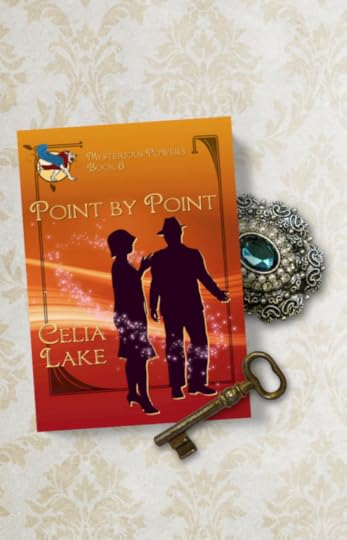 Galen needs a book
Galen needs a bookGalen – and his best friend Martin – appear first in In The Cards, my locked room murder mystery romance. (Every 1920s series needs a locked room murder, right? In this case, it’s more like ‘remote island’, but same idea.) I loved Galen there, but Laura wasn’t the right partner to bring out the best in him.
I also wanted to spend a bit more time with Galen’s brother, Julius. Wounded by a permanent facial injury during the Great War, his parents originally brought him out to that remote island for privacy. But even there he was isolated from his brother. In the aftermath of the events of that book, Julius and Galen have set up in another of the family homes. They’re joined by Blythe, formerly their mother’s companion, but now very much Julius’s partner both in alchemical work and romantically.
Galen, for his part, is working hard to get the family business back on an even keel after some of his father’s poor business decisions. It’s kept him too busy to spend a lot of time with his friends. By the time the book starts, he’s finally getting some traction.
Dwellers at the ForgeGalen’s friends – and Martin’s – of course are the Dwellers at the Forge, the secret society they both joined while at Schola. The Dwellers are a progressive, sometimes radical group, looking to shape themselves on Prometheus bringing fire to humankind. While they’re got their share of rituals and traditions, a lot of what they do together either involves mutual support in thier various projects or assisting in larger social efforts. That can run from strikes to political protests and actions to getting down into the grunt work of taking care of people in need.
I do have plans to explore all seven of the Schola secret socities in more depth down the road (including another round with the Dwellers). I love exploring the ways people connect that are about shared goals, dreams, or aspirations, not purely friendship or romance.
Dick FrancisI was a horse-obsessed child and teenager. Of course I read all the Dick Francis novels that were out up through the late 90s. Dick Francis was an incredibly prolific author. (His wife Mary was a tremendous help. She handled a lot of the research from what they talked about in various interviews.) But he was, before that, a quite good jockey on British steeple chase tracks.
Almost all of his books had something to do with horse racing – sometimes it’s absolutely central, sometimes it’s more tangential. His experience gave those parts an absolute solidity. I love the immersion in a particular kind of live that Francis did so well.
When I was casting around for a setting for this plot, I had wanted to do something with horse racing for a while. I spent a couple of months rereading a bunch of the Dick Francis books. I discovered they’d aged much better than I’d expected. (They’re still books of their time, so there are things that didn’t age well.)
But I discovered they’re also much kinder than I remembered. What had stuck in my brain were the fast-moving plot aspects, the dangers and risks. But there’s also quite a lot of Francis’ protagonists wanting to help out, when they’re caught in a weird situation, and going to some lengths to follow through.
The plot ended up taking me on a tour through equine genetics. (Including things I half remembered from my time in 4-H and Pony Club). That went on into a side line of what the boxes at various race tracks looked like in the 1920s. And of course a few social settings for the fast set and a house party with unsettling moments. I do like a house party.
Up to no goodThe end of Magician’s Hoard left a thread hanging: what was going on with the secret society or snake cult? I wanted to pick up that thread now the initial trials had happened. Who were these people, what were their actual goals, and how did the whole thing work? I won’t spoil the details here, but I did spend quite a lot of time eyeing Mesopotamiam archaeology reports from the tail end of the Great War period (1918 through the early 1920s).
Some people are entirely too tempted by power, and will do anything they can to claim it for themselves.
If these things intrigue, pick up a copy of Point By Point.
The post Idea to Book : Point By Point appeared first on Celia Lake.
April 6, 2023
Kobo Plus – check out my books!
I’m excited to announce that Kobo Plus has just expanded to the United States and the United Kingdom (meaning it now covers all five English language Kobo territories). All my books are available through this service, but read on for more details.
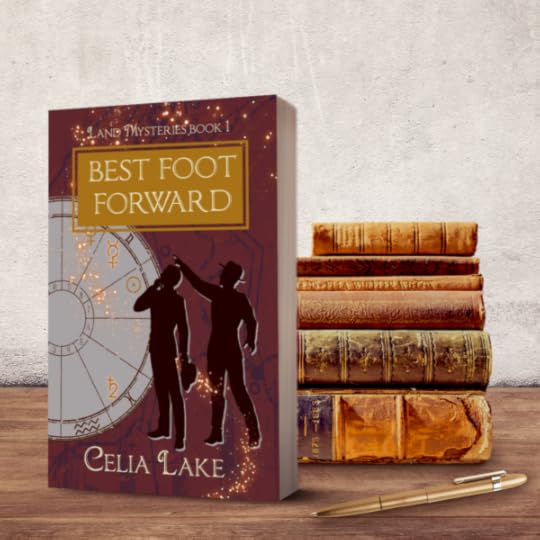 The basics
The basicsKobo Plus is a subscription service where for one monthly fee, you can get access to all the books available through Kobo Plus for no additional cost. For Kobo Plus, you can subscribe to get ebooks, audio books, or both for a monthly fee.
Read Kobo’s announcement with all the details and pricing. Here’s more help information about Kobo Plus. (If you’re coming from outside the US and that link doesn’t work for you, check the “Help” section. Look under “My eBooks and Audiobooks” or something similar to that.)
In most places (including the US and UK), you can try the service for a month for free. See under “Good to know” below for a little note about this if there are authors you want to particularly support.
You can read on the web, in a Kobo ereader, or using apps on your mobile devices. Whichever way suits you at the moment!
As of April 5, 2023, Kobo Plus is available in all five major English language territories (the United States, the United Kingdom, Canada, Australia, and New Zealand) as well as Belgium, France, Italy, the Netherlands, and Portugal.
My booksAll my published books are available via Kobo Plus. I’m excited for a new way for readers to find my books and to help out readers who may be on a tight budget. And I’m always a fan of readers having lots of choices in where and how they can get my books. My books have been available via Kobo Plus in other territories since I started writing, so I’m delighted to add the US and the UK.
You can read other books via Kobo Plus if you see “Free on Kobo Plus” on the description.
Note: There’s one ghost edition of Eclipse that shows up in my searches right now that doesn’t have Kobo Plus on it. I’m not sure where that’s coming from right now and I’m trying to figure out how it got there. There is an edition that’s available via Kobo Plus if you keep scrolling or search for the title + author specifically.
Also good to know: Kobo Plus has different requirements and policies than Kindle Unlimited. Check out the “Good to know” section below for a bit more about that.
Other authorsAccess to Kobo Plus in the US and UK is brand new, so while a number of authors (including me) have been in it in other locations, authors are making a variety of choices right now. Some are putting some of their books in (like first in series, or particular series). Some are putting none of their books in. Some are putting all of their books in.
I expect to see authors making a range of choices over the coming months. People will get a sense for how this new service is working and how it fits into their publishing plans. I know some authors want to wait and get a sense of how it works after a wave of new trial subscriptions. Authors also have all sorts of different priorities or things they can handle at the moment.
Good to knowThere are a few other details readers might want to know.
Kobo Plus is different than Kindle Unlimited in one big way: exclusivity
Kindle Unlimited requires authors to be exclusive to Kindle with their ebooks if the book is in Kindle Unlimited. (At least indie authors like me – big publishers get different rules here.)
In other words, if your book is in Kindle Unlimited, that (or buying it on Kindle) are the only way readers can get it. It’s not available from other ebook stores (Apple Books, B&N Nook, Google Play, Kobo, Smashwords, etc.). And it’s also not available to libraries through the library ebook sources.
Kobo Plus doesn’t have that rule. eBooks in Kobo Plus can be everywhere else the author wants – other ebook stores, libraries, etc. That’s why I’m delighted for Kobo Plus and why I’m not in Kindle Unlimited. Again, I want you, my readers, to make your choices about where you get your books that work for you.
The free trial is just that – free for you! It does mean authors will not get paid for books read during that trial (only once you start paying for your subscription). If you’d like to particularly support an author, you might want to wait until you’re on a paid subscription to read their books.
Me, I’m running on the theory that people who like my books will stick around.
Authors get paid by reading time rather than page count, using a calculation Kobo’s been making in other territories. (This is a sort of complex calculation, but it’s meant to help deter scammers.) Again, I’m personally pretty confident this will be fine for me and my books and my readers.
Got more questions? I don’t have unique info here – just what I’ve picked up talking to other authors and reading the information from Kobo. Their help info is quite complete, so check there if you need more help getting started. Do let me know if there’s some problem with one of my books in particular, and I’ll see if I can sort things out for you.
The post Kobo Plus – check out my books! appeared first on Celia Lake.
April 5, 2023
Pre-orders now available!
Have you wanted to make sure you can get my books as soon as they’re released? Now you can pre-order them on Kindle, Apple Books, Nook, Kobo, and Smashwords!
The pre-orders for Old As The Hills (out on May 5th, 2023) and Upon A Summer’s Day (out on June 21st, 2023, an unusual Wednesday release for me) are both available now – click through on the title to get all the links.
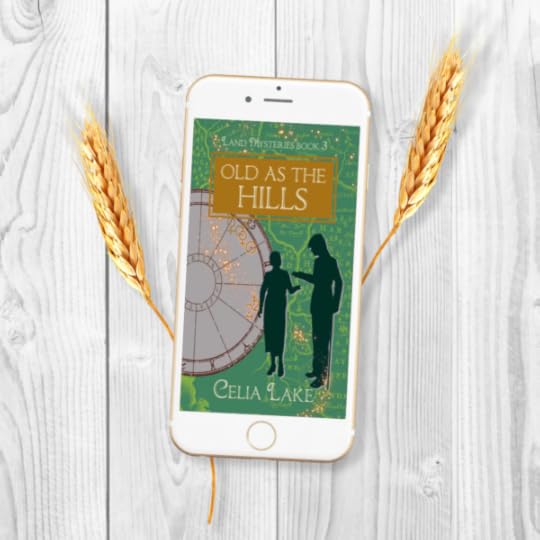
I’ll add the Gumroad link just before the release date, and the other ebook sources will become available as the files work through the various systems. (Once the book’s out, a request to your local library sometimes shakes things loose, too.)
Going forward, you can expect to see pre-orders coming out about 12 weeks before the book’s release date. Keep an eye on my newsletter for the latest and to get a glimpse of the covers.
If you’ve got questions, let me know through the contact form or reply to any of my newsletter emails.
The post Pre-orders now available! appeared first on Celia Lake.
March 22, 2023
Idea to Book: The Hare and the Oak
Welcome to this week’s installment of “Idea to Book”, this time taking a look at The Hare and the Oak. It was a chance to take a look at three different strands I hadn’t spent much time wtih before. First, a deeper look at some of the implications of the Great War and the land magic. Second, what it’s like for someone who’s magical but not folded into Albion’s culture to figure it out. And third, a later in life romance (and what that means for Cyrus, in particular.)
As always, there are some mentions of things that are spoilers (though I’m not getting deeply into the plot details of the book).
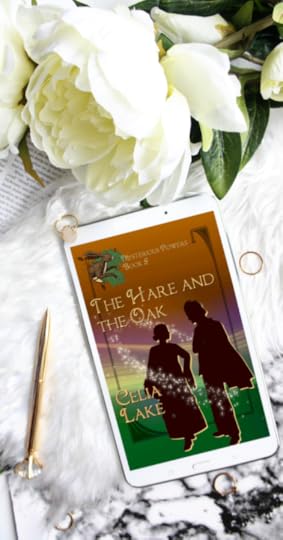 Land magic and the implications of the war
Land magic and the implications of the warOne of the things I think about a lot – fairly obviously if you read more than a few of my books – is the way the Great War changed people. Specifically, and also repeatedly, how it changed their relationship to the land magic. Great Britain and Ireland weren’t touched by direct fighting the same way as continental Europe war. (Or as they would be in the Blitz and other bombing raids of the Second World War.) And yet, there were an awful lot of changes to the land as a result.
There were even more changes for the people who went and fought and came back. The sheer fact of being in the trenches would be destructive to many people’s land sense. That’s even before you get into issues like shell shock, trench collapses, or the sheer awful misery of trench warfare in general.
A variety of experiencesGeoffrey Carillon, in his various books, recovered his through a set of chance timing. It brought him back to Ytene at a key point in his own life after he’d been pulled out of the trenches for other war work. Some people, like Adam in Mistress of Birds recovered some of it, but a lot more slowly and uncertainly due to other parts of their War.
Right now, I’m editing Old As The Hills and Upon A Summer’s Day, books that focus on Gabe and Rathna. More than one person notes that Gabe is unusual for not having had that particular damage to his landsense to work around. His injury happened just before he could have enlisted.
Other ways that could goBut there are lots of people who are still struggling with that, and who like Lionel did not necessarily get some of the tools or magical approaches that might have helped bridge the gap. It’s possible, for example, that if Lionel’s father had lived a bit longer, Lionel might have recovered enough of the land sense without being responsible for managing all of the implications yet. Or maybe not.
A new view of AlbionOne thing I wanted to do somewhere about this point in my writing, was have fun with a character who was coming into Albion’s culture – and especially its assumptions about that culture – as an adult. Nora’s not a point of view character, but her opinions about some of this nonsense are quite obvious on the page. She’s not afraid to question the things that seem foolish to her. But she’s also willing to listen to the fact there might be a reason for them.
Nora’s a teacher by profession, and she’s curious. But she also doesn’t have a lot of previous experience to match against, because her background is so different. This means there’s a lot of fun to be had with Cyrus and Mabyn trying things out. They have to figure out what she responds to, and whether she can learn what’s needed promptly enough.
A later in life romance (and Cyrus in particular)Finally, I heard from more than a few readers that they really enjoyed seeing an older couple (in Seven Sisters). I wanted to spend a bit more time with a romance like that. Cyrus, of course, first got significant page time in Sailor’s Jewel, where he’s a significant secondary character. I wanted to contrast the death of his wife (very young, and in traumatic circumstances that led to a number of Cyrus’s later choices, including his challenge for the Council) with Mabyn’s.
Her marriage was a good one by the standards of the Great Families, but it was not at all happy. It was emotionally constraining at the very least. Quite arguably it was emotionally abusive and neglectful for significant periods of her marriage. Seeing how she was willing to look at things again, and how building some trust with Cyrus in other areas changed her view of him – and other parts of her world – was great fun.
I particularly love the way they balance each other, in terms of personality, magical interests, and background, without actually overlapping all that much except for both being on the Council. (Don’t worry, there’s more coming, as an extra, about Cyrus’s time as head of the Council starting in 1932.)
Do these intrigue? Check out The Hare and the Oak.
The post Idea to Book: The Hare and the Oak appeared first on Celia Lake.
March 15, 2023
Idea to book: Fool’s Gold
Fool’s Gold has a slightly different origin than many of my story ideas. Kiya (my friend and editor) had been talking to a friend of theirs who loves a disaster elf. Kiya told me about that. And then promptly said I should do something more with Robin, I hadn’t done a villain redeemed book yet.
Which, to be fair, is exactly what Robin is made for.
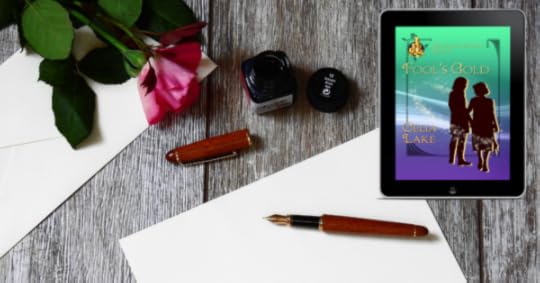 Villain redeemed
Villain redeemedRobin turns up in two earlier books. He appears briefly in Wards of the Roses, wanting to get more involved with the research that begins at the end of that book. Kate isn’t at all sure what she thinks of him, and Kate has good instincts.
Here’s how she describes him then:
Kate paused, then cleared her throat. “He did the thing where a man reaches to kiss your hand, a little click of his heels, the precise angle of the bow, and the – gleam in his eye. Not the sort who’d push you into a convenient dark corner for his own pleasure, but the sort who uses his charm to get what he wants.”
And of course, if you’ve read Seven Sisters, Robin has definitely been up to no good, and with some potentially dangerous results. He’s so bent on what he’s searching for that he doesn’t see anything else, or doesn’t think about the consequences.
The question with Fool’s Gold was how to write a story where he could be an engaging protagonist and have a romance that was satisfying. That meant he had to grow up a little and get more honest about what he wants. Leaning into Robin’s own skills of persuading people (and being a con artist himself at times) and what that meant when he was in a situation where he wanted to use them to help someone was lovely. Rolling around in Robin’s love of colour and art was even more.
Cousins and Fool’s GoldOf course, the other thing that comes up here are the Cousins, the lines of families descended from the Seven Sisters, seven Fatae women who might or might not be deities, it’s hard to tell. As Vivian says in response to Cadmus’ question here, in Seven Sisters:
“That was a, do you call her a goddess?”
“I call her Grandmother Electra, so I don’t have to think about that, mostly, actually.” Then she continued. “You watching, it’s not, I said this, it’s not a dangerous thing. But it’s an intimate one.”
Fool’s Gold gave me a chance to spend a lot more time with the Cousins, and with them being there on the page. (Robin’s terrifying aunts, as well as Vivian and Robin himself.) I hope to dig into the Cousins a bit more in some future book, because their particular family traditions fascinate me.
It’s worth noting that there are more human-shaped Fatae in existence than just the Seven Sisters (you’ll be seeing some of them in Old As The Hills, out in May 2023).
The Cousins downline from the Seven Sisters have tended to intermarry with humans more, and to build up a larger communal culture centered on particular kinds of magic (including the areas around particular portals). They’re also generally more able to tolerate living in iron-rich spaces like modern cities, while other of the Fatae descendents tend to prefer more isolated homes.
Banking and the custos dragonsI was not sure, until I got into the chapter where Emrys first appears, if the custos dragons talk. Clearly, they do, and the problem is more often getting them to shut up so you can get a word in edge wise. However, I’d been doing a lot of thinking about what a magical currency actually does.
The Scali (and the other banking families present in Albion, the Bardi and the Grindlay) all have large networks of trade with other banking families. The Scali and Bardi are off-shoots of historical Italian banking families in Florence. In real-world history, the Scali went abruptly bankrupt in 1326, due to a combination of factors, including Edward III not paying his loans. The Bardi hung on for about another twenty years, but then had the same problem.
However, it made sense to me that some portion of the family might have hung onto the magical banking aspect, and slowly rebuilt the rest of the banking after the Pact.
A brief digression into the gold standard:So what’s that magical aspect? Goblin Fruit mentions that the actual metal of the coins hold magic, especially those that have travelled widely. Every so often, coins need to come back and spend a cycle or so under a dragon, who tends them, syphons off the magical energy that might get disruptive, and smooths everything out.
This works out fine as long as we’re working with a gold-backed currency system, but that’s getting very shaky in the 1900s. (As Beatrice points out, Britain has been on and off the gold standard several times. I thought about trying to map out the timeline for that, and then decided that it was entirely too confusing to get into, and also Robin didn’t care about the details.) However, that magical effect and needing to cycle the coins through is still necessary in the magical community.
GeorgeAnd of course, if there are dragons, they have to have some people to hang out with. George is named George for multiple reasons. I keep wanting to name minor characters George, you see. (I tried to do it with four different people in Outcrossing, and Kiya pointed out quite reasonably that this was confusing. Even if it was an incredibly common name for a couple of hundred years for men.) However, I promised that if I called this one George, I’d stop trying to do it elsewhere. That’s worked quite well! And given the legends of St. George, naming the dragon-tender for him just amused me too much.
George is, as noted, also functionally a Cousin, though not descended from the Seven Sisters.
Does this intrigue? Check out Fool’s Gold. (Though as always, you might want to read Seven Sisters, first to get the full arc of Robin.)
The post Idea to book: Fool’s Gold appeared first on Celia Lake.
March 10, 2023
Nocturnal Quarry is in flight
Which is to say, if you wanted some more Alexander in your life, here it is! (This novella is an enjoyable read on its own, but will make much more sense in context if you’ve already read Best Foot Forward.)
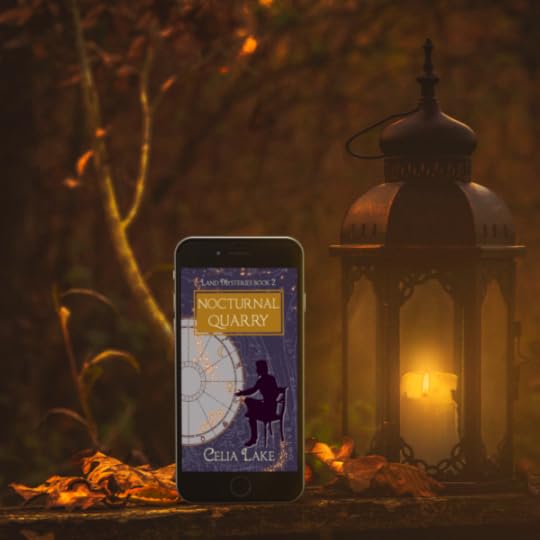
In 1938, Alexander is sent off to American to tend to some diplomatic matters on behalf of the Council. While there, he hopes to tidy up some loose ends – figuring out what’s happened with Geoffrey’s long-term nemesis, see what information he can get from American magical connections, that sort of thing. America has plans for him, in the form of several unexpected meetings.
Want a copy of your own?
Amazon Kindle Apple Books Google Play Gumroad Smashwords Other options(Kobo and Barnes and Noble Nook are still in the process – I’ll send a note to my newsletter and update here when those two stores are available.)
Oh, and if you’re curious about the art Alexander looks at while at the Metropolitan Museum of Art, there’s a post here for you!
The post Nocturnal Quarry is in flight appeared first on Celia Lake.



